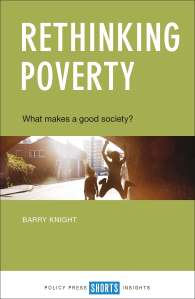Georgia Smith, Communications Officer at Webb Memorial Trust, highlights the accomplishments of sociologist and social reformer Beatrice Webb and her influence on a forthcoming book, Rethinking Poverty
International Women’s Day offers an opportunity to celebrate the work of a pioneering social reformer whose lifetime of research into the economic conditions of the working class enabled much of the social advancement of the 20th century but who is now largely forgotten: Beatrice Webb (1858-1943).
The legacy of Beatrice Webb
Beatrice Webb’s contribution was to provide substantial intellectual capital for the formation of the welfare state at a time when women didn’t even have the vote.
Her Minority Report on the Royal Commission on the Poor Laws and Relief of Distress 1905–09 recommended “a national minimum of civilised life” and advocated that government – rather than charity – should be responsible for the well-being of citizens.
Amongst other achievements Beatrice and her husband Sidney founded the New Statesman and the London School of Economics. She is also credited with coining the term “collective bargaining”
“…the seed from which later blossomed the welfare state”
As well as a brilliant mind, Beatrice also displayed sound judgement as an employer. She appointed William Beveridge as her research assistant and Clement Attlee as her campaign manager. Both were instrumental in implementing her ideas more than thirty years later with Attlee describing the Minority Report as “…the seed from which later blossomed the welfare state”. In his memoirs, Beveridge wrote that his eponymous report “stemmed from what all of us had imbibed from the Webbs”.
Although she lived to see the Beveridge Report of 1942, her death the following year meant that she did not see the 1945 Settlement.
Had she lived, she would have seen ‘thirty glorious years’ when the combination of full employment and social security led to ‘the great compression’ in which the gap between rich and poor narrowed, and poverty was much reduced. Social mobility was created in this context.
The absolute destitution that had produced ‘cities of the poor’ described by Sidney and Beatrice Webb in The Prevention of Destitution (1912) had all but disappeared by the mid-1960s. As a result, an understanding of poverty based on a relative measure, rather than an absolute one became the norm owing to the pioneering work of Peter Townsend.
Beatrice’s enthusiasm for ‘eugenic planning’ and her naively uncritical view of Soviet communism have been rightly criticised.
She was as imperfect as historical advocate of radical change and was in no sense a prototype feminist let alone a supporter of women’s suffrage. She believed herself to have “never suffered the disabilities assumed to arise from my sex”.
However, she identified a wider women’s movement allied with international labour within which women were challenging not just gender relations, but other forms of subordination too.
If Beatrice were to come back to life now, what would she think?
On the one hand, she would be staggered by the visible wealth of our society.
She would notice that people live longer, enjoy free medical treatment that is almost unimaginably better than it was in her own day, are better fed, better housed, enjoy more leisure and more sophisticated entertainments and have a higher standard of living.
There are amenities that cater even to the most trivial of wants – so long as people can afford it.
On the other hand, she would observe the prevalence of poverty that would be shocking to her.
She would see a state of affairs that, for all its improvements, with features in common with her own time. Workers on zero-hour contracts arriving for shifts only to be turned away might remind Beatrice of the income insecurity faced by day labourers jostling for dock work.
Although she lived to see the Beveridge Report of 1942, her death the following year meant that she did not see the 1945 Settlement. Had she lived, she would have seen ‘thirty glorious years’ when the combination of full employment and social security led to ‘the great compression’ in which the gap between rich and poor narrowed, and poverty was much reduced. Social mobility was created in this context.
The absolute destitution that had produced ‘cities of the poor’ described by Sidney and Beatrice Webb in The Prevention of Destitution (1912) had all but disappeared by the mid-1960s. As a result, an understanding of poverty based on a relative measure, rather than an absolute one became the norm owing to the pioneering work of Peter Townsend.
Beatrice’s enthusiasm for ‘eugenic planning’ and her naively uncritical view of Soviet communism have been rightly criticised. She was as imperfect as any historical advocate of radical change and was in no sense a prototype feminist let alone a supporter of women’s suffrage. She believed herself to have “never suffered the disabilities assumed to arise from my sex”.
However, she identified a wider women’s movement allied with international labour within which women were challenging not just gender relations, but other forms of subordination too.
“Anti-poverty campaigners are running up a downwards escalator to make progress”
Now, as then, Beatrice Webb would have seen a system of social assistance in eclipse. She may have seen some cause for optimism in the technical capabilities of the twenty-first century. She may have seen grounds for pessimism in the preference given to a narrow economic rationalism over compassion among the country’s political classes.
She would be dismayed to note that her suggested solutions – state action – combined with a robustly planned economy are no longer working to reduce poverty.
She would observe that anti-poverty campaigners are running up a downwards escalator to make progress, while using language that has hardly been updated 75 years on from the Beveridge Report – despite a wholesale revolution in social attitudes.
Progress today
The fact that progress has stalled is addressed in a forthcoming book, Rethinking Poverty, by Webb Memorial Trust Director, Barry Knight. The book is based on a five-year research programme conducted by the Webb Memorial Trust.
The starting point is that our society supports a wealthy minority to flourish, while around one-fifth experience chronic poverty and many people on middle incomes fear for their futures. Research for Rethinking Poverty suggests there is an impressive consistency in what most people want – security, fairness and independence – a narrative dominated by social factors rather than economic ones.
Social policy has failed to find answers to these problems and there is now a demand for a new narrative to enable us to escape from the crisis in our society.
This book argues that we need to start with the society we want, rather than framing poverty as a technocratic problem to be solved. It calls for a bold forward-looking social policy that addresses continuing austerity, under-resourced organisations and a lack of social solidarity.
Based on a research programme involving leading organisations, academics, community activists, children, and surveys of more than 12,000 people living in poverty, a key theme is power which shows that the way forward is to increase people’s sense of agency in building the society that they want.
Rethinking poverty by Barry Knight can be ordered here for £7.99.
Find out more about impact, influence and engagement at Policy Press here.
Policy Press newsletter subscribers receive a 35% discount – sign up here.
This blog was originally posted on the Policy Press blog site. The views and opinions expressed on the Policy Press blog site are solely those of the original blogpost authors and other contributors. These views and opinions do not necessarily represent those of the Policy Press and/or any/all contributors to this site.



